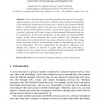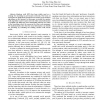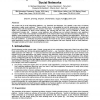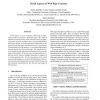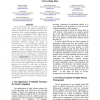CIKM
2009
Springer
14 years 6 months ago
2009
Springer
This work investigates personalized social search based on the user’s social relations – search results are re-ranked according to their relations with individuals in the user...
UIC
2009
Springer
14 years 6 months ago
2009
Springer
Social networking has provided powerful new ways to find people, organize groups, and share information. Recently, the potential functionalities of the ubiquitous infrastructure le...
WETICE
2009
IEEE
14 years 6 months ago
2009
IEEE
—Social networking web sites, which allow users to create identities and link them to friends who have also created identities, are highly popular. Systems such as Facebook and M...
ICC
2009
IEEE
14 years 6 months ago
2009
IEEE
—Random walk (RW) has been widely used as a strategy for searching in peer-to-peer networks. The boom of social network applications introduces new impact to the classical algori...
CSE
2009
IEEE
14 years 6 months ago
2009
IEEE
The current set of social networking platforms, e.g. Facebook and MySpace, has created a new class of Internet applications called social software. These systems focus on leveragi...
CSE
2009
IEEE
14 years 6 months ago
2009
IEEE
—With the growth in the past few years of social tagging services like Delicious and CiteULike, there is growing interest in modeling and mining these social systems for deriving...
CSE
2009
IEEE
14 years 6 months ago
2009
IEEE
—We study large online social footprints by collecting data on 13,990 active users. After parsing data from 10 of the 15 most popular social networking sites, we find that a use...
CASON
2009
IEEE
14 years 6 months ago
2009
IEEE
In this paper we try to consider a Web page as information with social aspects. Each Web page is the result of invisible social interaction. This interaction between different gro...
HICSS
2010
IEEE
14 years 6 months ago
2010
IEEE
Social networking sites and other examples of online social spaces have greatly expanded their members’ opportunities for self expression and social interaction, while creating ...
WWW
2010
ACM
14 years 6 months ago
2010
ACM
Geography and social relationships are inextricably intertwined; the people we interact with on a daily basis almost always live near us. As people spend more time online, data re...

